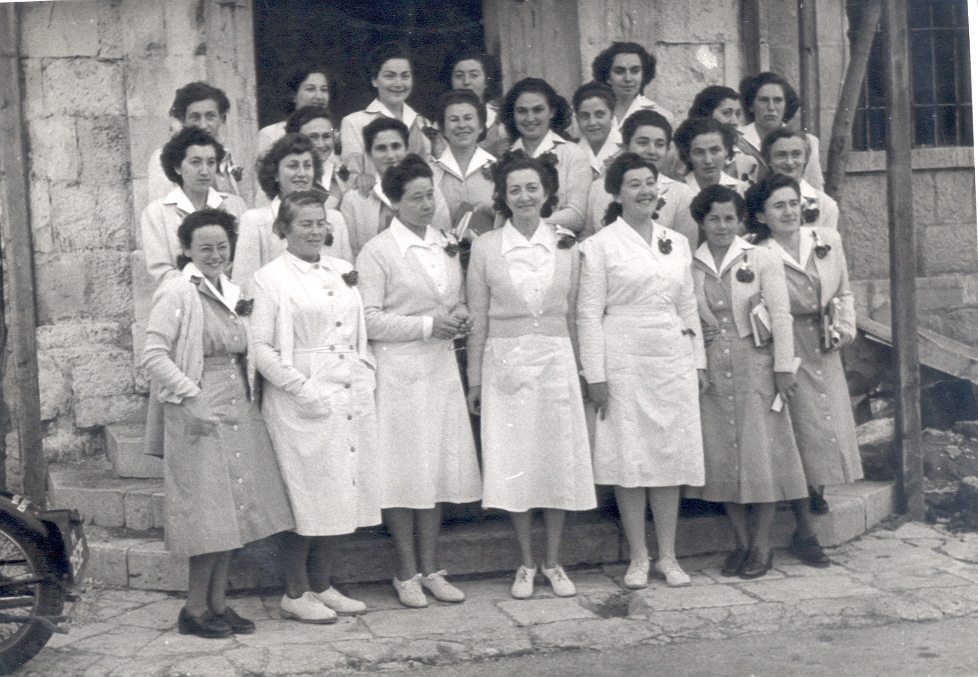 The Establishment of the School
The Establishment of the School
In 1941, motivated by her strong belief in the need to develop occupational therapy in Palestine, Ethel Bloom-Naor persuaded Hadassah, the Women's Zionist Organization of America (HWZOA), to grant her a scholarship to study occupational therapy at New York University (NYU), with the understanding that she would then introduce an occupational therapy service in Palestine.
The national board of HWZOA realized that in order to develop occupational therapy in Palestine, there would be a need for more than one clinic. This led to the decision to open a program that would meet the standards of the American Occupational Therapy Association and the American Medical Association. Between 1941 and 1946 Hadassah provided four additional scholarships to study occupational therapy in the United States to women who were planning to immigrate to Palestine.

The first occupational therapy course in Palestine was initiated on January 6th 1947, and began with 24 students, under the auspices of the Hadassah Nursing School and Kupat Holim (the National Health Fund). The initial purpose of the course was to train highly professional occupational therapists to provide for the clinical needs of the population. In order to accomplish this goal and to assure a high level of the program, all students were required to have a full matriculation. Most of the clinical training in the first years took place in general hospitals (mostly in orthopedic and tuberculosis wards) and in psychiatric hospitals.
Becoming an Academic Program
With the establishment of the State of Israel, the country's gates were opened to immigration – resulting in the tripling of the population, and dramatically increasing health needs. The growing need for occupational therapists led to the realization that it was necessary to establish occupational therapy in Israel as an academic profession, which was already the accepted practice in the United States and Canada. Ms. Lea Levi, the Director of the Occupational Therapy Program, initiated and led the process of becoming an academic program. The program was submitted to the Israel Council for Higher Education (ICHE), which gave full accreditation in 1978 and recognized the School of Occupational Therapy of the Hebrew  University Medical Faculty as the first academic occupational therapy program in Israel.
University Medical Faculty as the first academic occupational therapy program in Israel.
That year, an affiliation agreement was signed between Hadassah, the State of Israel, the American Jewish Joint Distribution Committee in Israel (JDC) and the Hebrew University of Jerusalem. The new goals of the academic school were defined as follows:
"To provide occupational therapy education and research:
(a) to train occupational therapists to meet the requirements of modern occupational therapy in the hospital and in the community
(b) to raise the standards of the Occupational Therapy profession and
(c) to provide teachers of high quality for the Schools of Occupational Therapy now in existence, or soon to be opened, to meet the ever-growing need for occupational therapists…
For the purpose of this agreement, courses in occupational therapy education and research shall train students in the field of occupational therapy for the Bachelor's degree in Occupational Therapy (BOT)."
These goals were fulfilled under the administration of Ms. Bella Efrati (Director of the School of Occupational Therapy: 1978-1997). Today, graduates of the school provide clinical services in numerous facilities throughout Israel. Moreover, as a result of the demand for clinical occupational therapists and academic interest in the profession, two additional occupational therapy programs have since been introduced in Israel (at Tel-Aviv University in 1985 and at Haifa University in 1987), both of which were initially headed and staffed by graduates of the Hebrew University-Hadassah School of Occupational Therapy.
In 1996 an academic monitoring committee was appointed for the School of Occupational Therapy by the Faculty of Medicine. The committee recognized the school as the academic leader in the occupational therapy field in Israel, its excellence recognized both in Israel and abroad. This level of excellence is reflected by the great emphasis that the School of Occupational Therapy places on continually broadening and improving its academic programs. In 2002 the ICHE decided to extend all the occupational therapy programs in Israel to three and a half years and in 2003 the first cohort was accepted to the new three and a half year program. As a result, the undergraduate program underwent a systematic and profound change with the new curriculum endorsed by the Education Committee of the School of Occupational Therapy and approved by the dean of the Faculty of Medicine of Hebrew University.
The Establishment of the Graduate Program
Since the approval of the Hebrew University and the Israel Council for Higher Education (ICHE) in 1990, the graduate program of the School of Occupational Therapy has been part of the Medical Sciences branch of the Faculty of Medicine. The Master's level program was initiated and chaired by Prof. Noomi Katz. The introduction of the program brought with it many opportunities for academic development. At that time, it was decided that each year 15 new students would be enrolled. Courses in the program were taught by a number of academics with expertise in the subject matter of the various courses. Initially, the teaching faculty consisted of only two occupational therapists who were on the academic track (Prof. Noomi Katz and Dr. Tamar Weiss), shortly thereafter to be joined by Dr. Shula Parush. Despite the small number of faculty members, many research projects were initiated, some were funded and many were published in scientific journals and presented at national and international conferences.
Due to the high demand of students wishing to enroll, the Master's level program has since developed to include two tracks: a research track and a non-research track for occupational therapists wishing to expand their theoretical knowledge with the purpose of clinical implementation. The non-research track Master's degree was authorized by the Hebrew University's Standing Committee of the Senate. This option appeals to therapists in key clinical positions who wish to complete a Master's degree without having to write a research thesis. As a result, the number of students in the graduate program grew significantly. It should be noted, however, that ever since the establishment of the non-research track, the number of applicants to the research track has remained consistently higher.
The first two PhD candidates in Occupational Therapy, within the Medical Sciences branch of the Medical Faculty of the Hebrew University, were admitted in 1996. The main goal of the PhD program is to provide more in-depth academic research, as well as to train future academics. To date, seven students have received PhD degrees from the Hadassah-Hebrew University School of Occupational Therapy and numerous candidates are at various stages of their doctoral studies.

